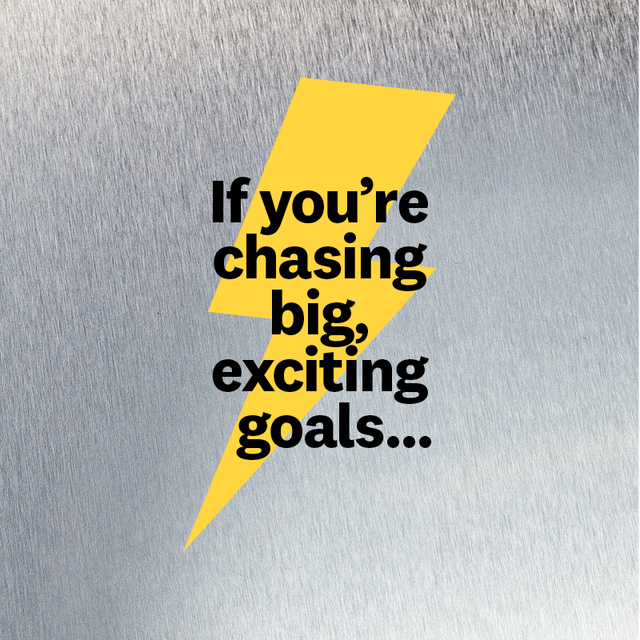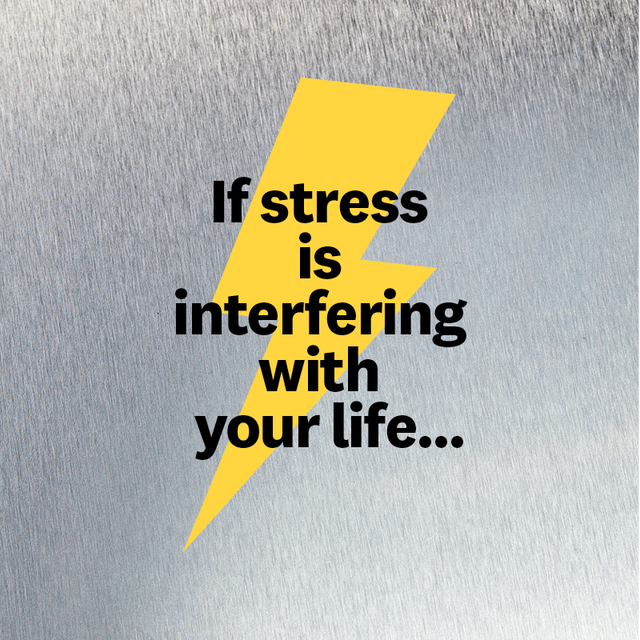Picture this: You’re about to “perform.” (We’re talking anything from speaking in front of a crowd, to running a 10-K, to having a tricky convo with your boss, to wowing on a first date.) You feel the familiar sensations of sweat forming on your neck and your heart beating quickly. Stop and remind yourself, I can do this. I’m not afraid of a challenge. Now, subtly shift your breathing, inhaling, then exhaling for twice as long. You might be clenching your jaw too; let that go. You probably feel calmer and more confident just reading this, right?
This type of self-assurance practice includes the exact tools you’d learn in the realm of sports psychology, or performance coaching. For years, decades, even, experts taught athletes in particular how to use these specific skills both in their sport and out in the real world. But it’s becoming more and more common for these professionals to work with people outside of sports altogether—helping them to find accomplishment in many aspects of their lives.
The demand for sports psychologists across different fields is impressive these days, says Andrea Wieland, PhD, president of Winning Systems, Inc., and the former associate athletic director for sports performance at the University of Pennsylvania. The application is prevalent in military environments, among performing artists (think: Cirque du Soleil), with business people, and in medicine, she says. So, interestingly (but perhaps not that surprisingly given the info just discussed), in response to the growing appeal, “more colleges and universities are offering a master’s degree in sports psychology,” Wieland adds.
As the world works to right itself amid the COVID-19 pandemic, sports psychs offer the support needed for this type of universally relatable struggle. The end goal is to implement mental toughness skills so you can face high-stress situations and challenges more effectively—both to optimize performance and to improve overall well-being (we’ll get into the nitty-gritty later!). “Especially now, these skills are more valuable to the everyday worker because of the uncertainty and difficult situations and pressure that have arrived in people’s lives,” says Lennie Waite, PhD, a Houston-based former Olympic athlete and a sport and performance psychology specialist.
To be honest, Waite considers the word sport in the name somewhat limiting, as it can deter or confuse people who are attracted to these psychology tools but aren’t, say, leaders in athletics or C-suite business professionals. (There’s a common myth that it’s not “for” them.) “Yes, the techniques were developed for high-performing athletes, but they’re transferable to many other environments,” Waite says.
So what is sports psychology, ultimately? Let’s dig into how these professionals help you rewire your thinking to emulate an achievement and confidence mindset—and how you can do it on your own.
The Gist Of It All
Sports psych and performance coaching (the two phrases are often used in tandem or interchangeably, FYI) overlap with positive psychology and cognitive behavioral therapy (CBT). Here’s the nuance: “Sports psychology techniques are focused more on mental skills training and performance enhancement,” Waite says. In other words, instead of obtaining a diagnosis of a clinical disorder from the Diagnostic and Statistical Manual of Mental Disorders 5, like generalized anxiety or OCD, she says, “it’s more focused on finding out what an individual’s goals are and helping them close the gap between where they are and where they want to be.” So, to be clear, it’s not used to manage serious mental health issues on its own, the way standard therapy might be—but it does implement some of the same skills.
What you learn in this type of coaching (see “Psych Yourself Up”—ahead!) shifts you from feeling out of control to focusing on things you can deal with, says Wieland. You become better able to manage fear and stress more effectively and gain a sense of agency in your own life. “When people feel they have mastery over themselves—over their minds, bodies, emotions, energy—their mental health and lives feel more in control.”
Putting Sports Psych Into Practice
Let’s say you’re a budding triathlete who works in marketing. Self-doubt overtakes you before races—and before big meetings that require you to present and lead in front of your colleagues, or in job performance convos with your boss. You’re reading this article and see yourself in the pages. Your first step could be to find a performance consultant (more on the next page). Then your coach would likely conduct a thorough assessment so they can personalize your sessions around the necessary areas—be it something obvious like quelling anxiousness ahead of public speaking, or something more nuanced, like learning to better regulate your response to negative feedback.
From there, alongside your coach, you’ll work to implement mental tools to overcome those issues, as well as “rehearse” the challenges and envision your success at them. Your coach may have you think of the methods you use to get your head in the game at a race-starting swim, for instance, then come up with ways to transfer that into how you show up for your Zoom presentations.
How often you meet with your practitioner (be it in person, virtually, or via text) is personal, though, and can be determined by your needs and schedule, says Lisa Bonta Sumii, LCSW, founder and CEO of AthMindset LLC, and mental health and sport performance specialist for a professional soccer team in Oakland, California. She even offers clients “micro-sessions” of 25 minutes.
Applying From The Gym To Life
The ultimate goal? To face your hurdles feeling equipped and empowered, as opposed to feeling bogged down by stressors, and then having to climb out of the mess as it’s happening. That’s why Bonta Sumii’s recommendation is to have a relationship with a performance coach in place, like how every woman has a gynecologist. Just as you go to the doctor’s for an annual checkup and work out to keep your body healthy, you might also visit a performance coach to help keep your mind in tip-top status—on its own or in tandem with traditional therapy and other practices in your toolbox. “We all know the difference between physical health and physical illness, but mental health and mental illness have been synonymous for so long,” Bonta Sumii says. “It’s important to promote spaces and conversations where people can learn and practice the language of mental health.”
What’s more, those with the healthiest mind states tend to be the ones constantly striving (in a good way!) to achieve, and who are action-oriented and have ambition, Waite adds. “Performance coaching helps create structure, pathways, and support mechanisms for people to enhance their strengths and make them more effective overall.” Game face, on.
You can enhance your own mental wellness right now by implementing these simple behaviors. Practicing them *regularly* returns the real results.
BUILD YOUR FOUNDATION
Sleep is the number one performance tool, says Wieland. “It affects your mood, movement, memory, and muscle repair—so improving the quality and getting the right amount of sleep is a great way to feel better on all levels.” And while pro athletes are known to snooze up to 10-plus hours a night (hi, Venus Williams and Maria Sharapova), seven to nine tends to be sufficient for most. Prioritize that to offset the training and hard work as often as you can.
SET THREE CLEAR TYPES OF GOALS
Bet you didn’t realize there are different kinds! They include process, performance, and outcome, says Bonta Sumii, LCSW. “Let’s say I’m on a soccer team and I want to win the league—that’s the outcome goal.” To get there, you need process goals that represent a clear route to success. (For instance, I want to be able to defend 10 shots on goal per training session.) The performance goal measures progress along the way toward the achievement of that outcome goal—which might look like using a centered breath before penalty kicks to improve control. Each one should also be SMART: specific, measurable, attainable, realistic, and time-bound.
CREATE A PRE-PERFORMANCE RITUAL
This is your preparation piece. Ahead of a race, that could be picking out your outfit, prepping the right pre-run meal, and figuring out exactly how you’ll get there. It could also include painting a mental picture. “When there’s a lot on the line, it’s really important to visualize going through that process and thinking about what emotional reactions are going to pop up, how you are going to control them, and how you are going to stay really focused on the task at hand,” Waite explains.
Ahead of go-time, too, try closing your eyes and imagining how you want your future self to feel. Pull on all of your senses: How do you want to feel, temperature-wise, when you’re lining up at the starting line? Do you want to hear the excitement of the other runners around you? Maybe you can even taste that energy gel.“You’re painting the scene about what you feel, hear, even taste, from a first-person perspective,” says Bonta Sumii. Do this several days before your performance, then rehearse it each day leading up to game time. (Note: This also works for life situations like a first date.)
TRY THE SWIMMER’S BREATH
Intentional control over your inhalations and exhalations is the fastest way to calm your physiology (pumping heart, sweaty pits) and mind, says Wieland. “Doing so creates space to make an intentional response, rather than reacting,” she says. “It also brings awareness to your thought patterns so you can reach for a better idea, instead of getting sucked into negative thinking.”
Breathing out more than you pull in is calming to the central nervous system. So tap this method by inhaling, tensing your whole body, then letting out a looong exhale until you literally have to inhale again.
Another strategy that’s a bit more discreet: 4-7-8 breathing. Inhale for four counts, hold for seven, and exhale for eight for a few rounds. Wieland notes that you can focus on your breath anytime, like before bed, when your alarm goes off, or standing in line.
SPEAK NICELY TO YOURSELF
Replace self-sabotaging thoughts with encouraging ones. Positive affirmations can be as simple as “You’ve got this” or “You’re good.” Psst: Talking to yourself in the third person (“you”) is more effective than using the first person (“I”), research shows. This also works to regulate emotions after a loss (e.g., you didn’t get a certain outcome or you’re grieving).
BE GRATEFUL OUT LOUD
You’ve probably heard that gratitude is good for you. “Gratitude is a skill that soothes the soul,” says Wieland. Expressing gratitude for three things (big or small) each day can improve your mood, relationships, and productivity, research shows. She recommends starting a daily gratitude journal, in addition to actually expressing that sentiment to someone directly to level up the experience (which research supports!). Send a text or written note to tell someone you’re thankful for them, and why.
FIND THE SILVER LINING
When the Olympics were postponed in 2020, Waite worked with participants on finding an upside to the disappointment. For example, if a runner had a nagging injury, the delay would give them the chance to fully recover. Or if they felt they’d rushed through base training, they could now take a step back and fill in those holes. “There was a silver lining for every single athlete, and I do the same when I work with people in businesses,” says Waite. If you lost your job during the pandemic, perhaps it gave you a chance to consider what you really wanted out of your career.
Teacher Training
With so many types of mental health professionals out there, shopping for the right expertise to implement performance psychology tactics into your life can be confusing. Your guide:
What’s keeping you up at night? One (or more) large agenda item on the horizon? You may be a perfect candidate for a performance coach. The worry, lack of motivation, or fear of disappointing others can be relieved by having a helper to make these specific skills second nature, says Wieland.
LOOK FOR Certified Mental Performance Consultants (CMPCs) from the Association for Applied Sport Psychology (appliedsportpsych.org)
CHECK OUT Restoic app (restoic.com), Topknot (topknot.app), or the Optimize Mind Performance platform (optimizemindperformance.com)
We’re talking prolonged anxiousness, and when typical coping mechanisms (like the ones you just read about!) aren’t helping. Or your worries are messing with work and relationships. That’s when someone with a background in mental health, in addition to performance skills, may be a better bet.
LOOK FOR An LCSW or a PhD (you can inquire about their performance coaching experience too)
CHECK OUT Psychologytoday.com to easily find a provider in or near your zip code that’s a good fit for you



















